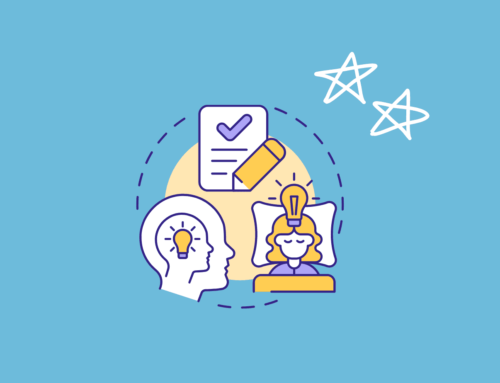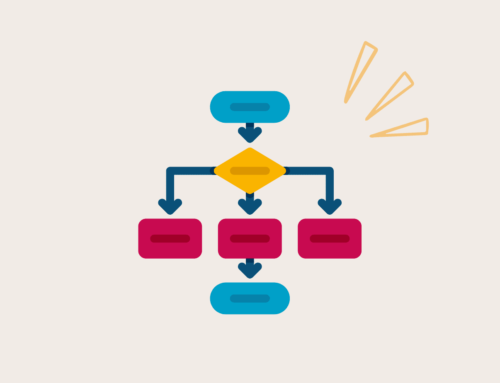
Test anxiety is a common struggle many of us students face. However, learning how to overcome the fear of failure in exams is crucial because it can seriously get in the way of your academic performance.
Here’s a short story about my personal experience with test anxiety:
In high school, I had a math teacher who would almost always throw curveball questions on exams. As someone who’s always held myself to high academic standards, this was very stressful.
In preparation for exams, I would do as much practice as I could. But even so, right before each exam, I could feel my palms sweating and my heart beating faster.
Once, I got stuck on so many questions in a row that I actually contemplated feigning sick, just so I could have an excuse to leave the exam room. Ultimately, I didn’t go through with this plan (it probably wouldn’t have worked anyway), but instead began hoping that the ground would open up and swallow me whole to save me from my misery.

However, once I calmed down enough, I realized that the questions weren’t as bad as I’d initially perceived them to be. In fact, most of them only seemed challenging because I had expected them to be challenging. The anxiety from this expectation had impeded my ability to think properly.
I ended up having this math teacher for 3 of my 4 years in high school. Over time, I learned to build up resilience against test anxiety and work better under stress.
In this post, I’ll be sharing 21 actionable tips so you too can overcome the fear of failure in exams. From developing a positive mindset to implementing effective study strategies and prioritizing your physical well-being, I’ll be covering everything you need to do to conquer your doubts and achieve your academic potential.
Let’s dive in!
Understanding the Fear of Failure
Before we jump into the tips, it’s important to understand how the fear of failure can manifest itself and why it’s so important to confront this fear.
Symptoms
If you have a fear of failure in exams, you may find yourself experiencing feelings of apprehension or dread before exams. This may cause you to delay studying or engage in negative self-talk, both of which only serve to heighten your anxiety.
If your anxiety is particularly severe, you may even experience physical symptoms like headaches or a rapid heart rate.
Psychological Impact
The stress, anxiety, and self-doubt associated with test anxiety can have a profound psychological impact. According to this paper published in the National Bureau of Economic Research, “Large spikes in cortisol levels can lead to a lack of focus, recall, and ability to perform tasks.” (Cortisol is a hormone associated with stress.)
On a biological level, stress literally impairs your ability to learn and process information. Therefore, it’s crucial to learn how to manage your test anxiety.
Common Causes
We all experience test anxiety for different reasons, but here are a few common causes you may resonate with:
- Fear of disappointing yourself or others (like your parents)
- The potential impact of grades on future opportunities (like college acceptances or career trajectory)
- Past negative experiences (such as getting poor grades despite working hard)
- Comparing yourself to others and feeling inadequate
However, no matter the cause(s) of your fear of exams, it is possible to overcome this fear and unlock your academic potential. Keep reading to learn how!
Reframe Your Mindset
If you experience test anxiety, you’re probably stuck in a vicious cycle of procrastination, feeling like you’re “not smart enough,” and doing poorly because you don’t think hard work can pay off. In this section, you’ll learn tips to break out of this cycle and embrace your potential for growth.
Tip #1: Cultivate Self-Awareness
First, you need to confront your fear head-on and identify the root cause(s). In the previous section, I listed some possible causes: fear of disappointing yourself or others, fear of losing future opportunities, fear of hard work not paying off, and fear of being inadequate compared to peers.
However, you could be scared of studying for a mix of these reasons or due to something else entirely. A helpful way to figure out what’s stopping you is to grab a pen-and-paper and simply jot down your feelings.
Often, when I’m scared about something (like doing poorly on an exam), journaling helps me introspect and identify the root cause of my fear. I find that as I write, I begin to uncover hidden causes of my fear that I wasn’t conscious of before. Often, I come to realize how irrational my fear is, and this awareness helps me manage my test anxiety better.
Tip #2: Develop a Growth Mindset
If you struggle with test anxiety, it may be because you have a conscious or subconscious belief that no matter how hard you work, you won’t be able to get satisfactory grades.
However, it’s essential to realize that your abilities can be developed and improved over time. But in order to improve, you need to adopt a growth mindset: you need to believe that improvement is 100% possible.
Here’s a little personal story:
I’ve never been much of a history person, so when I took my first rigorous history class, I felt completely overwhelmed. In spite of this and the fact that I didn’t like the class, I was set on getting good grades and doing the best I could. I took meticulous notes and spent many days studying for my first exam.
But.. I ended up getting a totally unsatisfactory grade and feeling very dejected afterward.

However, instead of letting this drag me down, I decided to develop a new approach to the coursework. I realized that in preparation for the first exam, I had used a very inefficient and ineffective way of studying.
For the following exams, I learned to refine my learning and studying techniques. Ultimately, I was able to finish my second semester with an A-plus!
The lesson from this story is that adopting a growth mindset is a total game-changer. To overcome your fear of studying, you need to realize that you can improve. And as cheesy as it sounds, the first step is choosing to believe in your potential for improvement.
Tip #3: Embrace Challenge
You may feel intimidated by an upcoming exam if the material being tested is difficult. However, instead of interpreting the outcome as a black-and-white situation (success or failure), you should view the situation as a valuable learning opportunity, no matter what happens.
When you face difficult concepts, see it as a chance to not only expand your knowledge and skills but to increase your resilience. If you’re able to master the material, then you’ll look back on your achievement and realize that you’re capable of overcoming seemingly insurmountable obstacles. In the future, when you’re challenged with other difficult concepts, you’ll have more confidence in your ability to master the concepts.
However, even if you don’t end up getting a satisfactory grade, you shouldn’t view your grade as evidence of your inability to do better. Instead, view the unsatisfactory grade as an opportunity to identify areas of weakness and improve your study techniques.

This is how I responded to my initially disappointing exam grade in history. Instead of seeing my bad grade as a dead end, I saw it as an opportunity to pinpoint my weaknesses and improve my studying and test-taking skills for the future. From this, I gained critical thinking skills that ended up helping me in other subjects.
Failure taught me more than success could have.
Tip #4: Become Process-Oriented, Not Goal-Oriented
While setting goals can provide a source of motivation, you can’t become too goal-oriented. That’s because it’s easy to get so fixated on end results (e.g., good grades) that you begin attributing your self-worth and satisfaction in life to those outcomes.
However, goals are fragile and unreliable. In high school, I chased after good grades and attributed much of my self-worth to my academic performance.
When I got a bad grade, I felt terrible and began questioning my potential. However, when I got a good grade, I usually got a rush of joy that vanished within an hour. The next thing I knew, I was worrying about the next exam. All my self-esteem teetered on my grades, which caused me high anxiety and frequent episodes of self-doubt.
You see, the problem with being goal-oriented is that goals have unreliable outcomes. Also, even if you do end up achieving a goal, the expected satisfaction usually doesn’t even last long.
The solution? Become process-oriented. Find joy and intrinsic value in the process, rather than fixating on end results. When you study because you find intrinsic value in the learning process itself, you’ll find that it becomes a more joyful and rewarding experience.
As you’re studying math, think about how it’s improving your logical thinking and creative problem-solving skills. As you’re working on an essay for English literature, think about how it’s improving your critical thinking skills and appreciation for the complexities of humanity and society. See education as a privilege—an invaluable opportunity to develop essential skills and develop a well-rounded perspective on the world we live in.
Tip #5: Practice Self-Compassion and Positive Self-Talk
Once you’ve identified the cause of your fear of failure, practicing positive self-talk can help you realize how irrational your fear is and gradually dispel of it. Treat yourself as you would a child who needs encouragement.
Just as harsh criticism and pessimism obstruct a child’s potential for growth, negative self-talk obstructs you from achieving your academic potential. Conversely, patience and reassurance can become powerful tools in overcoming your fears and building confidence.
Here are some examples of positive self-talk:
Fear of Disappointing Yourself or Others
“Instead of worrying about what I can’t control, I should only concern myself with what I can control—putting in my best effort regardless of the results. I will give it my best shot, and that’s all I can ask of myself.”
“Mistakes and setbacks are a part of the journey. Failure doesn’t have to mean anything, as long as I learn from my mistakes and keep moving forward.”
“My parents love and support me unconditionally. They want me to succeed, but they also understand that exams can be challenging. They won’t hold a bad grade against me as long as I work diligently.”
Fear of Losing Future Opportunities
“There are countless opportunities out there, and life is not a linear path. Even if I don’t do well on the next exam, it won’t determine my future. Lots of successful people failed countless times before they made it to where they are.”
Fear of Hard Work Not Paying Off
“Every step I take and every effort I make is building a solid foundation for my future achievements. Every small increment of progress adds up.”
“My grade on this next exam does not determine whether my hard work pays off or not. No matter what happens, putting in a good work ethic is increasing my stamina and resilience, and every small bit of progress matters. I might not get a satisfactory grade on the next exam, but if I continue to work hard, I will eventually.”
Fear of Being Inadequate Compared to Peers
“I am on my unique journey, and comparing myself to others only hinders my progress. I will focus on my growth and celebrate my accomplishments at my own pace.”
“Every individual has a unique set of strengths, weaknesses, experiences, and resources. That makes it completely irrational to compare myself to others.”
Set Realistic Goals
Once you’ve learned to develop a more positive mindset toward exam-taking and grades, you need to create actionable steps to help you maximize your academic performance. That begins with setting realistic goals.
Tip #6: Break Down Large Goals
To make large goals less intimidating and more attainable, you must break them down into smaller, more manageable tasks.

For example, if you’ve never been great at math, setting yourself the goal of getting an A+ in your calculus class can be an unattainable goal in the short term. But that doesn’t mean that it won’t ever be attainable! It just means that you need to break the goal down into smaller, immediately actionable steps.
You might start by refining your study techniques. Instead of waiting until a few days before the exam to study, you may set yourself the goal of using more efficient note-taking methods and reviewing your lecture notes on the day of the lecture. You may also set yourself the goal of doing at least 5 practice problems each day and seeking help from a peer, tutor, or mentor if necessary.
These are easily implementable steps that can accumulate to help you make significant progress in the long run.
Tip #7: Set SMART Goals
SMART stands for the following:
- Specific: It’s hard to get started on a goal if it’s vague. You need to clearly define your goal.
- Measurable: You need a definitive way of measuring your progress.
- Achievable: The goal should be something you immediately start working toward, not something that’s too intimidating to get started on.
- Relevant: Identify why the goal is meaningful to you. This will help you stay motivated.
- Time-Bound: Set a time constraint for achieving the goal so you have a sense of urgency.
The concept of SMART goals is best demonstrated via an example:
- Specific: “I will improve my understanding of calculus concepts for the upcoming midterm.”
- Measurable: “I will achieve an average score of 85% or higher on calculus practice tests.”
- Achievable: “I will dedicate an hour of focused studying each day for the next three weeks.”
- Relevant: “Improving my calculus knowledge is essential for my academic success and pursuing my desired career in engineering.”
- Time-bound: “I will accomplish this goal before the exam date, which is in three weeks.”
Develop Effective Study Strategies
As I realized in my history class, refining one’s study techniques can have a HUGE impact on academic performance. Often, it’s not that you’re “not good” at a subject; it’s that you’re not approaching it properly.
Tip #8: Create a Study Schedule and Stick to It
At the beginning of each week, sit down to create a study timetable. Designate specific time slots for each subject or topic to ensure that you have enough time to get to everything.
Also, make sure to leave time for a “catch-up” session each week. After all, you never know when you’ll end up spending longer on a topic than you initially intended.
A study schedule will help you stay organized, review all necessary material, and avoid last-minute cramming, which only adds to exam stress.
For more details, check out this step-by-step guide on how to plan your week as a student for maximum productivity and my favorite aesthetic planner app for students.

Tip #9: Use Active Learning Methods
Passive reading of your notes or textbook simply won’t cut it. You need to engage in active learning methods that require you to recall and synthesize information using your existing knowledge base.
You can achieve this by summarizing content in your own words, teaching it to a friend (or an invisible person), creating flashcards for quick revision, and solving practice questions. You can also employ mnemonic devices to remember tricky information.
Active learning keeps you actively involved and will make the material stick better.
Tip #10: Take Breaks While Studying
I’ll be the first to admit that I used to be terrible at this. I would do marathon study sessions that left my brain feeling fried. However, the funny thing was, I thought taking study breaks was a waste of time!
Since then, however, I’ve discovered that breaking my studying into shorter, focused sessions with regular breaks has improved my productivity. A popular technique is the Pomodoro method, where you study for 25 minutes, take a 5-minute break, and repeat. After 3-4 work sessions, you can take a longer break of 15-20 minutes.

The brief study intervals heighten your sense of urgency, and the short study breaks give your brain time to recharge. If you’re looking for a Pomodoro timer to use, check out this list of aesthetic study timers.
Tip #11: Practice Self-Testing
To prepare yourself for exam day, practice self-testing throughout your study sessions. If you have access to practice exams, try simulating exam conditions by removing study materials and setting a timer.
By doing so, you’ll identify areas that need more attention and build confidence in your knowledge. You’ll also prime yourself mentally for exam day.
Tip #12: Seek Help
If you’re stuck, don’t hesitate to reach out to your teachers, mentors, study groups, or tutors for guidance. You never know whose explanation might just click, and other people can often provide valuable insights that suddenly clarify difficult concepts.
I’ve found this to be especially true in math. When studying math from a textbook, it can often feel like a bunch of mumble-jumble and complicated formulas. But when the right teacher comes along and uses the perfect analogy or draws a clear diagram, previously convoluted concepts can suddenly come to light.
Tip #13: Find Resources
With the Internet at our fingertips, it’s not difficult to find helpful resources while studying.
Online forums and study communities can connect you with fellow learners, where you can exchange ideas and get different perspectives. You can also explore educational websites and apps that offer interactive lessons, video tutorials, and practice quizzes. These resources can complement your textbook readings and notes and enhance your understanding.
Practice Mindfulness and Stress Management
Too much stress quite literally impedes academic performance. In this paper published in Nature, researchers discovered that the hormones and neurotransmitters involved in stress can impair memory retrieval and result in underachievement on exams.
Therefore, it’s crucial to learn how to manage your stress properly.
Tip #14: Use Visualization and Positive Affirmations
Instead of dwelling on all the ways you could fail, visualize yourself succeeding in your exams with confidence. Visualizing positive outcomes helps reduce anxiety and enhances your belief in your abilities.
Additionally, practice positive affirmations by repeating uplifting statements to yourself. You’ll be surprised at the impact this can have on your mindset and overall well-being. Examples include:
- I believe in my abilities and trust in my knowledge.
- I am resilient and can bounce back from any setback.
- I embrace challenges as opportunities for growth and learning.
- I have the strength and determination to reach my goals.
Tip #15: Stay Active and Do Hobbies
With lots of schoolwork, it can be easy to neglect physical activity. However, your physical well-being plays a significant role in your academic performance. Exercise releases endorphins, feel-good hormones that will boost your mood and reduce stress levels.
Just including 15-20 minutes of physical activity in your daily schedule as a student can be beneficial.

Additionally, you should make time for hobbies and activities that bring you joy and help you unwind. Whether it’s painting, playing an instrument, cooking, or writing, indulge in activities that rejuvenate you and reduce your stress.
Tip #16: Get Enough Sleep and Eat Healthy
Make it a priority to get sufficient sleep every night. Seriously, I cannot stress this enough! You need to be well-rested in order to concentrate better, retain information, and tackle challenges with clarity.
For most of high school, I didn’t prioritize having a consistent sleep routine. I ended up feeling like a walking zombie most days and feeling like my critical thinking capacity was at zero.

In the year after high school, I began prioritizing sleep more.
I discovered that sleeping more completely transformed my ability to process information and tackle difficult problems. A challenging math problem that took me an hour to solve when tired could take me only 15 minutes after a good night’s sleep!
Also, you should make it a priority to fuel your body with nutritious foods. Opt for brain-boosting foods like fruits, vegetables, whole grains, and lean proteins. Stay hydrated and limit your intake of sugary snacks and caffeinated beverages that can disrupt your sleep and contribute to stress.
Do These Things on Exam Day
Ok, imagine now that exam day has arrived. You’re still feeling a bit nervous, but that’s totally normal. In fact, having slightly heightened stress levels can increase your mental clarity—it’s only excessive levels that impair your cognition.
In this section, you’ll learn about tips to keep your stress under manageable levels on exam day and maintain a positive mindset regardless of the outcome.
Tip #17: Wake Up Early
It’s never a good idea to feel rushed on exam day. Make sure you get up early and leave yourself time to get ready and mentally prepare for the exam.
However, remember that a good night’s sleep is essential for optimal performance. This means that you should have also gone to bed early the night before.
Once you’re up, brush up on key concepts that you’ve previously studied. This will help refresh your memory and boost your confidence.
Tip #18: Practice Deep Breathing Exercises
Even if you’ve spent lots of time preparing for the exam, you may still experience a sudden bout of nervousness when the teacher begins handing out exam papers. To keep your nervousness under control, practice deep breathing.
Inhale slowly through your nose, hold for a few seconds, and then exhale deeply through your mouth. Repeat this a few times to relax your nerves before the exam begins. According to The American Institute of Stress, “Deep breathing increases the supply of oxygen to your brain and stimulates the parasympathetic nervous system, which promotes a state of calmness.”
Tip #19: Return to Hard Problems Later
During the exam, if you come across a challenging problem that seems to be stumping you, don’t let it derail your confidence. Instead, move on to the next question and come back to it later.
By tackling the easier questions first, you’ll build momentum and gain a sense of accomplishment. Also, you may discover that when you return to a hard problem later, you’ll have a fresh perspective that can lead to breakthroughs and successful problem-solving. (I’ve discovered that this is often the case.)
Tip #20: Look Forward, Not Back
Regardless of how the exam goes, focus on the future, rather than dwelling on outcomes in the past. Even if you didn’t perform as well as you had hoped, you need to remember that a single test does not define your worth or ability.

Also, you need to remember that mistakes are an opportunity for growth. Instead of dwelling on your disappointment, focus on how you can tackle your mistakes so that you can avoid making the same ones in the future.
Indulging in negative self-talk will only bring you down—instead, believe in your potential for growth and move forward with determination.
Tip #21: Focus on What You Can Control
You may not be in control of the grade you get on any specific exam, but you are in control of your mindset and the strategies you use to approach studying. So choose to believe in your potential for growth, and set realistic short-term goals and action plans that will help you achieve your long-term goals.
Overview of How to Overcome Fear of Failure in Exams
We’ve (finally) arrived at the end of this long list of tips on how to overcome fear of failure in exams! Here’s a quick recap:
First and foremost, figure out what’s stopping you. Often, the fear of failure is rooted in irrational thoughts and beliefs.
Next, recognize that failure is not the end of the road but a valuable learning experience. Every setback provides an opportunity for growth and improvement.
Then, set realistic goals by breaking down your larger goals into smaller, manageable tasks. This will not only make your objectives more achievable but will also give you a sense of progress and accomplishment.
During your study sessions, remember to implement smart strategies, such as creating an organized study schedule, using active learning methods, practicing self-testing, and seeking help when needed.

Lastly, combine your efforts with mindfulness and stress management techniques. Your physical state matters as much as your mental state. Take care of your well-being, practice deep breathing exercises, engage in physical activity, and prioritize sufficient sleep.
As I wrap up this post, I want to reinforce the idea that overcoming the fear of failure in exams is a gradual process that requires patience and perseverance. It takes time to let go of deep-rooted, counterproductive mindsets and embrace a new attitude and routine.
However, working to overcome your fear of failure in exams is an effort that will be well-rewarded. At first, you may simply stop experiencing the desire for the ground to swallow you whole during an exam (as I did), but eventually, you’ll discover room for growth and personal strengths you hadn’t been aware of before!
For more posts on studying and student success, check out:
- Powerful Tips on How to Overcome Fear of Studying Quickly
- 10 Effective Ways to Stop Comparing Yourself to Others Academically
- Best All-in-One Aesthetic Planner App for Students
- 15 Aesthetic Study Websites to Instantly Motivate You
- 22 Tips On How To Romanticize Studying & Make Studying Fun
- How to Plan Your Week as a Student and Stick to Your Plan
- 7 Study Tips That Will Transform the Way You Study
What is one short-term goal you’ll be setting for yourself to start on the path of attaining your academic potential? Let me know in the comments below!

Learning With Angie is a place to share honest, unfiltered advice to promote student success. So if you’re a student (high school, college, or beyond) looking for tips on productivity, studying, personal growth, and more to reach your potential, this is the place! To read more about Learning with Angie, click here.


















